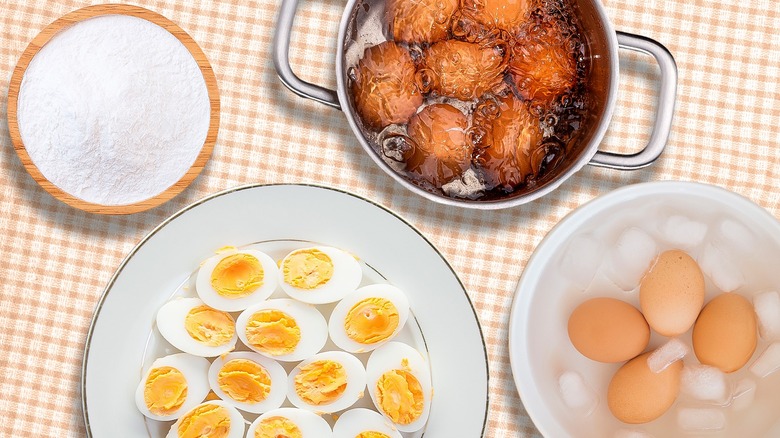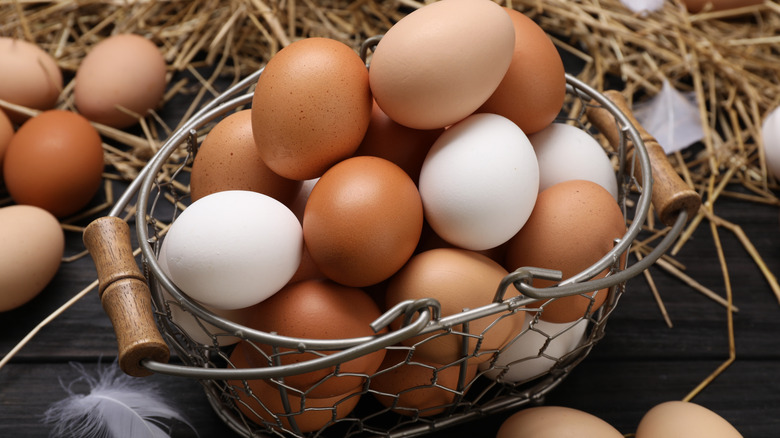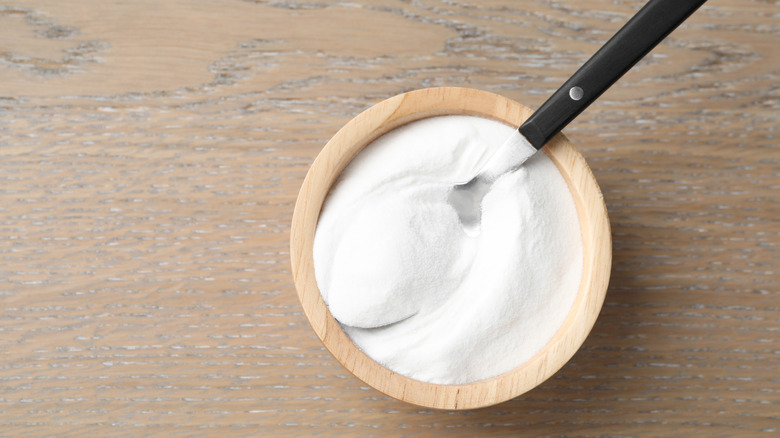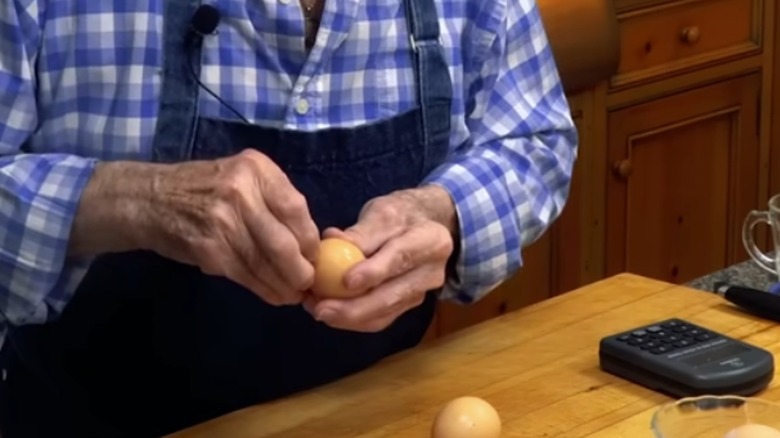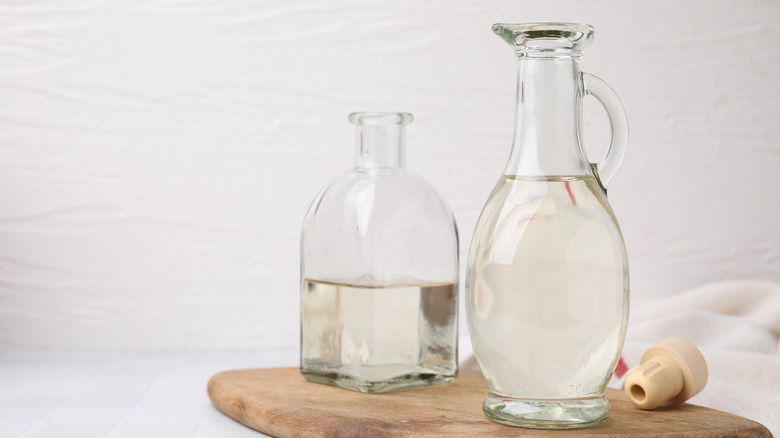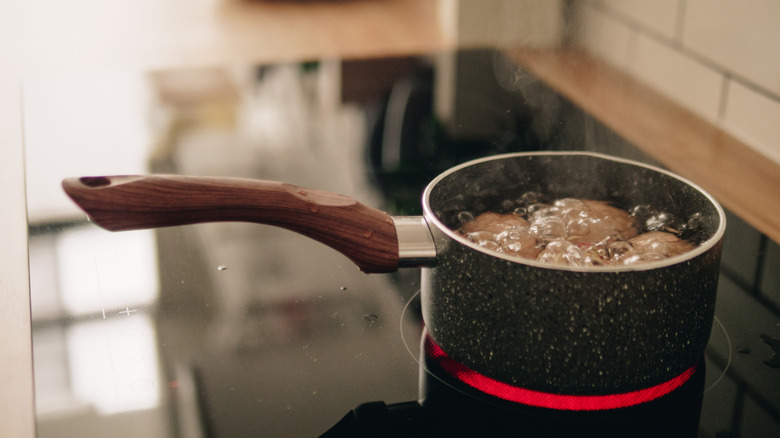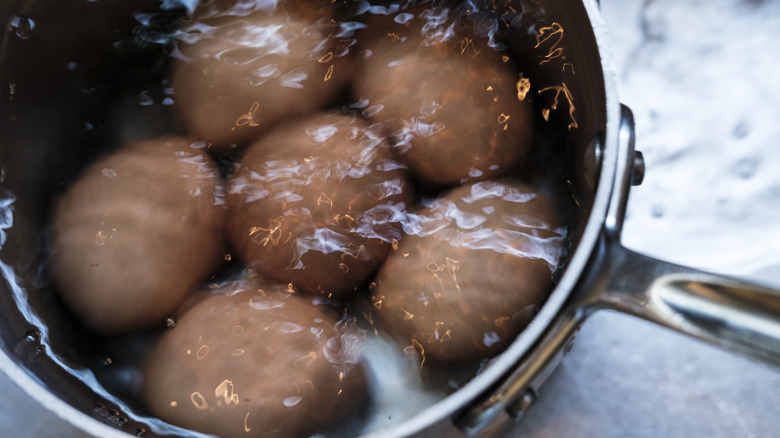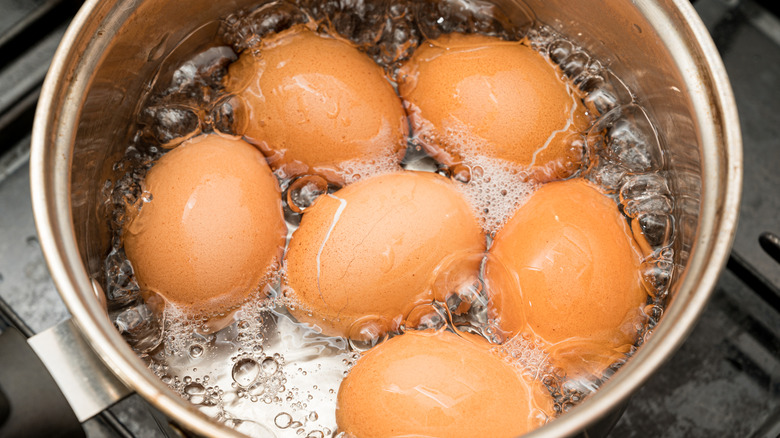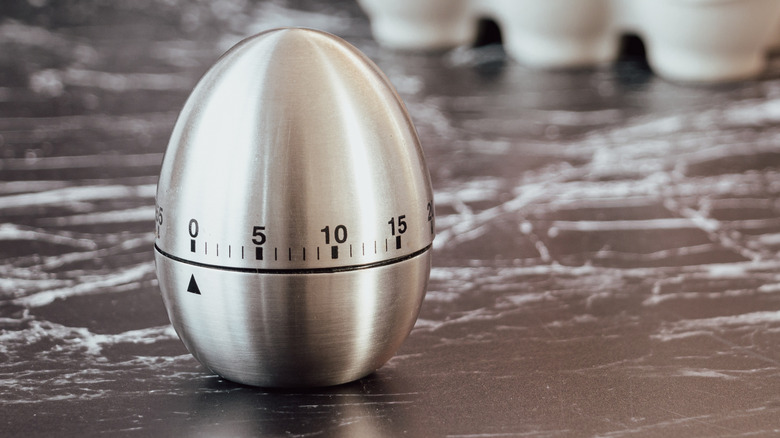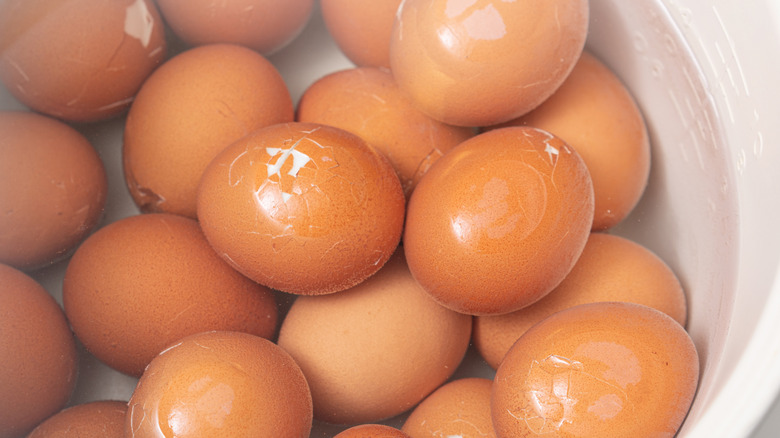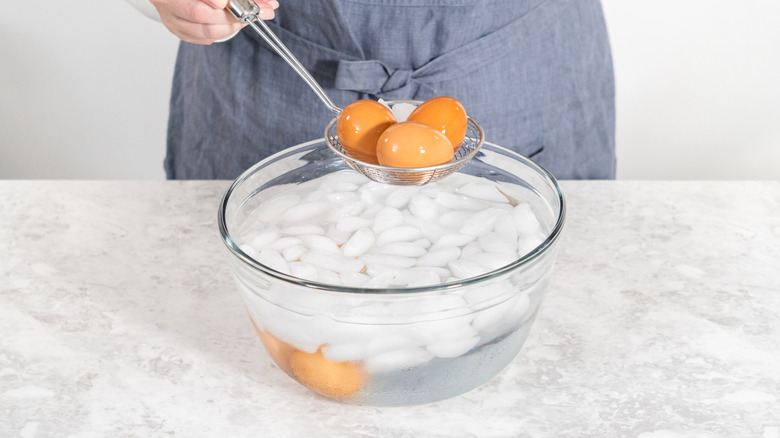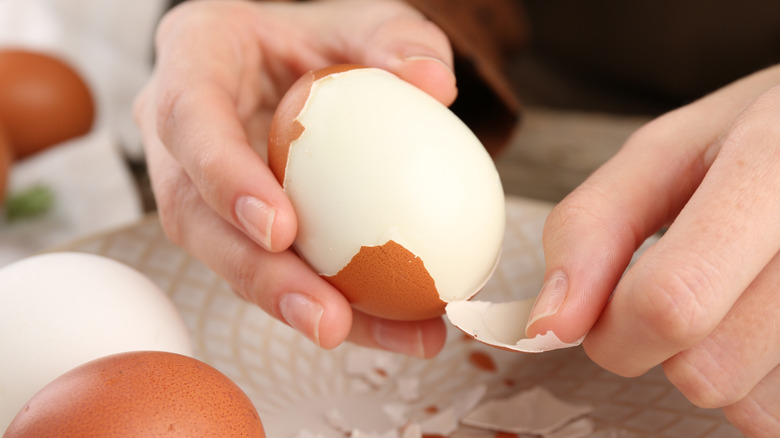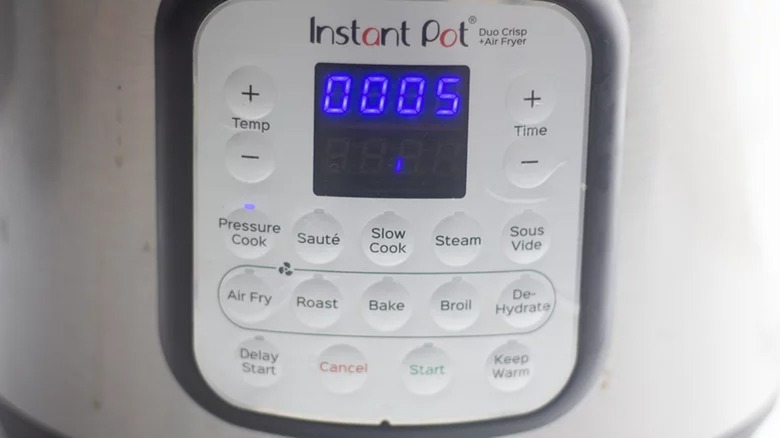12 Tips For Cooking Hard-Boiled Eggs Like A Pro
While you'd think cooking hard-boiled eggs would be simple, it's one of the easiest tasks that can fail if you don't have some pro tips at your disposal. At some point, we've all ended up with cracked shells, discolored yolks, pockmarks in the egg white, eggs that are too hard or too soft, or eggs we can't peel. It makes us wonder what went wrong. Luckily, it's all about science rather than chance, and it's science that is easy enough for even the casual cook to understand.
Ask any two chefs how they cook hard-boiled eggs, and there are bound to be variations. In fact, we did talk to two of them for their take on hard-boiled eggs: chef Lisa Counts, the executive chef and owner of The Chopping Block cooking school (and self-declared eggoholic), as well as chef Matt Finarelli, owner and an instructor for Red Jacket Cooking School.
There are pros and cons to some of the tips we have for you. So, you have to decide what's most important in your situation and choose the way of cooking hard-boiled eggs that works for you. Armed with all this knowledge about why things go wrong when you cook hard-boiled eggs, you can combine your favorite tips into a solid routine that will have you cooking hard-boiled eggs like a pro.
Don't use eggs that are too fresh
One hard-boiled egg tip to remember: It matters how fresh your eggs are. While most of us gravitate toward using the freshest ingredients in our foods, you'll want to go against your instincts when it comes to eggs.
There are two main advantages to using older eggs. First of all, you'll avoid ending up with eggs that don't peel easily, which results in pits and craters. Secondly, if you're making deviled eggs, you'll end up with yolks that are centered better. After all, you don't want to end up with a hole on the side of your egg where the yolk tried to escape. So, for best results, let your eggs sit for a few days or even a week or more before you use them for boiling.
Granted, if you wait until your eggs are too old, you get another problem: greenish gray egg yolks and a sulfur smell. This happens as the egg white becomes more alkaline with age and reacts with the iron in the yolk to make ferrous sulfide. Unfortunately, the longer you cook eggs, the greater the chance of them turning colors and smelling, too.
If you must boil fresh eggs, add baking soda
Obviously, there are going to be many times when you don't have the luxury of waiting a few days to let your eggs age. Luckily, there's a hack when using fresh eggs.
The reason fresh eggs don't peel well is that they have a more acidic pH level. And because they're more acidic, the egg white ends up getting stuck to the inside of the egg. Luckily, the shells are porous, and you can influence the egg's pH level by adjusting the pH of the boiling water. In this case, you want to make it more alkaline by adding baking soda. For every two cups of water you use for boiling, you'll need ¼ teaspoon of baking soda. Unfortunately, adding baking soda to your boiling water affects the egg's chemistry in another way. The flavor will change such that the egg will taste and smell more sulfurous. We're not talking rotten egg level here, but it's still pronounced.
If you don't want to add baking soda for whatever reason, there are two other options that can help firm up the egg white a bit. One is to boil the eggs longer, though that comes with its own negative side effects in color and smell. The other option is to put the cooked eggs in the fridge before peeling them so they can firm up a little more as they cool.
You might want to pierce the shell before boiling
Chef Jacques Pépin swears that making a hole in the shell helps him achieve perfect eggs every time. However, not all chefs agree about using this method. Whether to use this method or not may depend on the reason you're making the eggs in the first place.
Pépin creates a small hole in his egg shells to keep them from cracking. He starts off by using a thumbtack to create a small hole at the bottom of the egg — the heaviest part of the egg when standing vertically. However, there are also dedicated kitchen tools, like the Seki Japan Egg Pierce, for this purpose. The reasoning he gives is that the hole releases the pressure from the air bubble inside the egg to keep it from cracking during the boiling process.
Meanwhile, other chefs put a hole in the shell to try to achieve a better shape once the egg is peeled. Unfortunately, several chefs who have tried this method have found that it doesn't give predictable results. When we asked Chef Lisa Counts about this trick, she said she didn't think it made a big enough difference for her to bother with it most of the time. So, perhaps it's a better idea for when you're making something like egg salad where shape doesn't matter but you don't want half of your egg strewn across your pan because it cracked while boiling.
Adding vinegar has a couple of advantages (just don't mix it with baking soda)
A lot of chefs add vinegar to the water they boil their eggs in by default. One reason relates to making the eggs easier to peel. It also helps keep yolks yellow. However, if you add baking soda to the water (for fresh eggs), be sure you don't also add vinegar. That's because the chemical reaction between the two will turn your pan of boiling eggs into an erupting volcano science experiment.
Chef Lisa Counts is one who adds vinegar for better colored egg yolks. She says that she adds "distilled vinegar in the water before boiling the eggs as it seems to help prevent the yolks from getting discolored." However, she also points out that "as long as you don't overcook the eggs, it isn't really necessary." There's not a firm consensus on how much vinegar you need to use. While Counts uses only a splash of vinegar, our recipe creator, Susan Olayinka, uses ¼ cup of vinegar in her hard-boiled eggs recipe.
Others put vinegar in the water to help with the peeling process. The idea here is that the acetic acid in the vinegar reacts with the calcium bicarbonate in the shell. This reaction weakens the shell and makes it easier to peel.
There's a method for boiling room-temperature eggs
A lot of pros swear by starting out with room-temperature eggs rather than cold ones and putting them straight into boiling water. Once again, the reasoning behind it relates to preventing problems with the finished product.
There are two reasons for starting with room-temperature eggs and boiling water. The extreme temperature difference between a cold egg and the hot water often results in a reaction inside the egg, and the shell ends up cracking. If you've ever shattered a cold glass dish by putting it into a hot oven, you're probably familiar with what a temperature shock like this can do. The other reason for using room-temperature eggs in boiling water is to prevent the egg from getting stuck to the membrane of the shell and being harder to peel.
Luckily, it doesn't take a long time to get your eggs up to room temperature. If you put them near the stove when you start boiling the water, they will absorb some of the heat from the stove. Then, by the time your water is boiling, they should be warm enough to not experience extreme shock when you put them in the water. Just don't forget to turn the temperature down so that they don't crack from knocking against the sides of the pan and the other eggs.
But you can also start boiling cold eggs straight from the fridge
There's also a method that starts with cold eggs straight from the fridge. In this version of hard-boiled eggs, both the eggs and the water start out cold. If you choose this method, you'll want to weigh the advantages against the disadvantages.
Chef Lisa Counts says, "When I am making hard-boiled eggs, I generally start with eggs right out of my refrigerator mainly because I didn't plan ahead!" We've all been there. So, it's a good method to keep in mind. The other advantage is that it gives you really nice and soft egg whites. However, the disadvantage is that, unlike when dropping a room-temperature egg into boiling water, the membrane likes to stick to the egg with this method, which might make it difficult to peel.
Counts explains how she uses this method for boiling eggs. "I start them completely submerged in cold water," she says. "Once the water and eggs reach a full boil, I cook them for nine minutes." Nine minutes is less time than eggs take to boil when you drop room-temperature eggs into boiling water. But remember that the egg is starting to cook as the water gets up to the boiling point. However, if you don't watch the water, you might miss the moment it starts boiling and end up boiling the eggs too hard or overcooking them. So, you've got to stay vigilant with this method.
Use a gentle boil rather than a hard boil
One of the biggest mistakes you can make from the start is putting your eggs into water that is boiling too hard. The correct temperature for boiling eggs is between 180 and 190 degrees Fahrenheit, which gives you a gentle boil. After all, eggs are fragile. But there are other reasons, too.
If you've ever boiled eggs and ended up with a tail of egg white trailing through your water, it's because you boiled your eggs too hard and made them crack. If you forget to turn the eggs down to a simmer instead of a rolling boil, you're going to end up with cracked eggs that lose some of their egg whites to the water. It's an easy mistake to make.
Using a gentle boil will also prevent your egg from becoming rubbery. Why? The higher temperature that makes water boil hard and knocks your eggs against each other is above the temperature for protein coagulation. Thus, your egg whites will turn rubbery instead of coming out with the right texture.
Know how much time to boil your eggs for the results you want
The amount of time to boil eggs depends on several factors. You'll want to adjust for size, the yolk texture you want, and the temperature the eggs are when you start boiling them.
Generally, you're going to need 10 to 15 minutes of boiling time to complete cooking for a large hard-boiled egg. However, as we previously mentioned, it only takes about nine minutes from the time the water starts boiling if you start with cold water and cold eggs. For an extra large egg, add about an extra minute to the time, and for a jumbo egg add about two extra minutes. Of course, altitude makes a difference, too, since it changes the boiling point of water.
When it comes to how long to boil an egg for the type of yolk you like, we have a handy yolk texture guide that shows the results for both fresh and older eggs. At 10-12 minutes, the yolks will still be moist and creamy. Whereas,13-15 minutes will get the yolk cooked through, and it will be much drier. If in doubt, a tool like the Lasubst Egg Timer boils in the pot with your eggs and changes color to let you know how done your eggs are. Keep in mind that, just like boiling eggs at too high of a temperature, cooking eggs too long causes the proteins to overcoagulate and makes the eggs overcooked and sulfurous.
Slightly crack your eggs as soon as you add them to cold water
Chef Gordon Ramsay considers one of the secrets to flawless eggs is to slightly crack them as they're sitting in cold water after being cooked. The purpose is to make the eggs easier to peel.
When Ramsay finishes boiling his eggs, he has a specific regimen that he performs. First, he drains the hot water from the pan, leaving the eggs inside. Then, he adds cold tap water over the top of the eggs to start the cooling process. Unlike many cooks, he doesn't use ice water as a step. However, the reason he cools his eggs is one we've previously mentioned: preventing the yolks from turning a color other than yellow. With cold water now occupying the pan with the eggs, he cracks the eggs one by one on the side of the pan and places them back into the cold water in the pan. Then, as the cracked eggs roll around in the cool water, the water starts to make its way into the layer between the egg and the shell — thus, making the egg easier to peel.
Be sure to cool them in ice water long enough before peeling
While Chef Gordon Ramsay uses just cold water for his eggs, most chefs seem to prefer using an ice water bath for perfect hard-boiled eggs. Chef Lisa Counts says that an ice water bath is important after boiling "to stop the cooking process."
As we mentioned previously, cooking an egg too long can make the yolk turn grayish green and bring out a more sulfurous smell. That's why it's essential to stop the cooking process quickly. Rather than staying in the yolk, the sulfur will leach out into the water. Plus, the egg white will stay soft rather than go rubbery.
Something else worth knowing? Shocking the eggs with an immediate ice water bath gives your eggs a better shape. Unlike just using cold water and a gradual cooldown of the eggs, using ice water to shock the eggs quickly changes all the steam inside the egg into water. With the water taking up less space than the steam did, it gives the still-soft egg white a chance to fill in the space where the air pocket once was, making it smoother rather than dimpled as the egg white hardens. However, the hardening part is important. So, you want to leave the eggs in the ice-cold water for at least 15 minutes to give them time to harden so that they're easier to peel. They'll peel even better if you leave them in the fridge overnight.
There are a few strategies for peeling eggs
Many of the tips we've included explain what you can do to ultimately make hard-boiled eggs easier to peel. However, there are also strategies surrounding the egg peeling process.
Chef Lisa Counts relies on one specific method. She says, "After cooking, I like to lightly crack my cooked eggs all over their surface, gently rolling them on my counter to create what looks like spider veins in the shell. Then starting on one side, I peel them from top to bottom, creating a line on one side, and then peel the rest of the shell off. Doing this process under running cold water helps, too." Chef Matt Finarelli uses another peeling method after cooking his eggs in an Instant Pot. Just "tap on the fat end, and then peel the shell off in a spiral around the egg."
Another strategy we've seen on TikTok involves a spoon. You simply turn the egg so the fattest side is facing you and tap it with a spoon multiple times. Then, you peel off enough shell so that you can insert a spoon into the hole. Once the spoon is inside, you glide it over the surface of the egg and lift the shell off. Beyond a spoon, there are also a few gadgets that can help you peel eggs, like The Negg Boiled Egg Peeler, which calls for shaking eggs in a small container of water until the shell can be easily pulled off.
The 5-5-5 Instant Pot egg-boiling method is a game-changer
When we asked Chef Matt Finarelli about how he boils eggs, he said that "using the Instant Pot is life-changing with its ease and consistency, and especially ease of peeling afterwards." Once he tried it, he never went back to other methods.
Finarelli uses the 5-5-5 Instant Pot egg-boiling method. He suggests using a silicone egg trivet to keep the eggs in place and specifically likes the Goldlion Silicone Sling Lifter. If you position the eggs with the fat side up, he said "the air bubble appears right where you want it every time." To boil, he says to simply "place a cup of water in the bottom of the pot. (1 cup does it no matter how many eggs you're doing) and then cook on high pressure for 5 minutes. Then allow a natural pressure release for 5 minutes, then place in an ice bath for 5 minutes." So, 5-5-5 means 5 minutes each for cooking, pressure release, and an ice bath.
While many of our tips relate to making eggs easier to peel in the end, the Instant Pot method eliminates having to remember so many little tricks. Finarelli says that, with this method, "they all peel perfectly, every time! Old eggs, new eggs, I've literally NEVER had an egg come out of the pressure cooker that didn't peel with ease at the end of the time in the ice bath."
